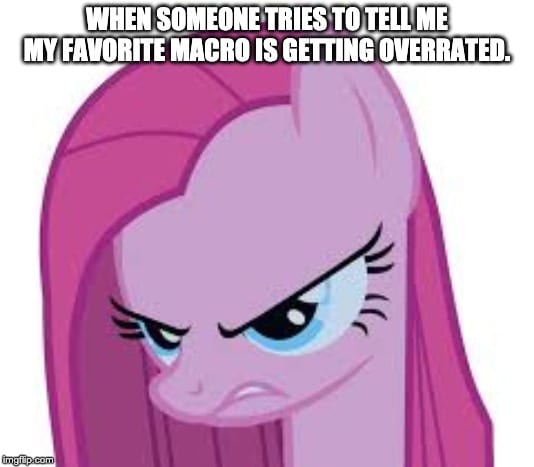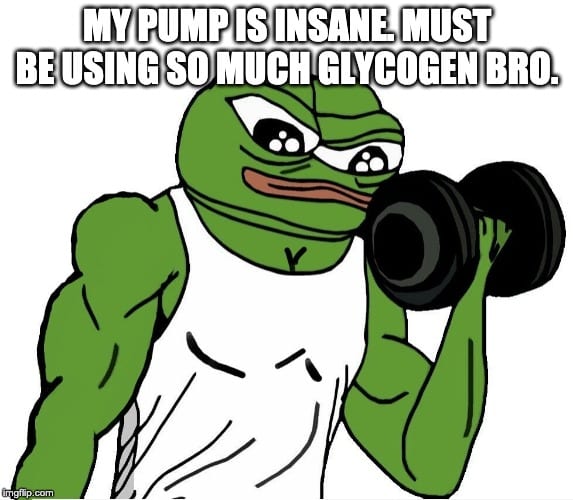Do Strength Trainees Really Need Carbs?
This is a guest post from Calvin Huynh inspired by our online PT Course. Calvin did a great job challenging the current dogma by summarizing the relevant facts without going into excessive detail.
Carbohydrates once had a terrible reputation with false claims of it being a health destroying, fat storing demon. Many fitness professionals has done a great job at debunking all these nasty rumors, but now it seems carbs are getting over admired.
Many coaches will claim you need a ton of carbs or else your hormones and performance will tank rapidly.
Fitness professionals are over emphasizing carbs simply cause if everyone is else is doing it, it must be true, right? Not to mention, you’ll sound like a war hero to gen pop followers for promoting pop tarts and pasta.
However, the truth is, unless you’re a high-level athlete playing an ultra-demanding sport, your carbohydrate needs just aren’t that high in most practical scenarios, even for advanced lifters and gym enthusiasts.
Before I jump into all the research, I just want to clarify I’m not bashing high carb diets. Don’t get hostile with me just because you worship bread. I love bread too and high carb diets can work fine. I’m simply addressing the exaggerated claims made about high carb diets just like many coaches have already been doing to low carb/ketogenic diets the last few years.
Intellectual honesty goes both ways my friend.
Carbs are Oversimplified and Misunderstood
If you ask the average coach a brief summary of the macronutrients, they’ll tell you protein is for muscle/satiety, fat is for hormonal health/nutrient absorption, and carbs are for performance/energy/recovery. Not a bad overview, but this oversimplification commonly seen in the form of Instagram infographics, does more harm than good.
It leaves out much nuances and consequently, people think carbs are incredibly crucial for performance, energy, and recovery despite not being true.
The Science Behind Why You Don’t Need that Many Carbs
Menno Henselmans is the one who originally provided me most of this data and got me thinking more skeptically about carbs in recent years. Let’s start with the mechanisms of energy production.
Your body has 3 energy systems to acquire ATP which supplies your body with energy for everything you do. These energy systems contribute to different degrees sequentially, but in overlapping fashion depending on the demand.
The first energy system is the aerobic system which oxidizes fat, carbs, and even amino acids. Some people think of this system for cardio despite it being highly active in strength training. This system relies on mitochondrial respiration making it’s output limited by oxygen.
As VO2 max increases and oxygen becomes limiting to meet the demands, the other 2 systems contribute more.
The next energy system, called phosphagen system is not limited by oxygen and provides ATP rapidly, but also gets depleted quickly after about 20-30 seconds of demanding work. It can replenish a bit quicker if muscles are saturated with supplemented creatine which every bro is already taking.
As VO2 max becomes limiting and the phosphagen system cannot keep up, the glycolytic system takes over. It breaks down carbs without being limited by oxygen and contributes to about half of ATP production in concentric dominant sustained power outputs like a 1 minute sprint or a sequence of takedowns.
Carbs by definition are the primary fuel source for exercise and after this overview which is commonly taught in many courses, many fit pros conclude carbs are the “fast” energy source, therefore prescribing high carb intakes. However, carbs are fast in the sense that they’re an efficient substrate in your body not fast in the sense of “if I eat more exogenous carbs, I’ll get increasing doses of Personal records being set.”
Glucose specifically can also be made without carbohydrates and in traditional strength training settings with sets under a minute and long rest periods, endogenous carbs are rarely a limiting factor considering the interactions of the energy systems.
Furthermore, strength training doesn’t rely on blood glucose as much as other styles of training. Lifting utilizes muscle glycogen (stored glucose) and even then, doesn’t use up that much.
No Really, Your Glycogen Stores Are Fine
Your body already has plenty of stored of carbs in the form of glycogen which just because it’s primarily used over blood glucose, doesn’t mean it uses much.
“But I’m so hardcore and train like an animal bro! I must be using so much glycogen!?”
No you’re not bro. The proof is in the pudding.
- Bodybuilders who did 15 sets of compound quad work and 5 sets of isolation quad work, all to failure only depleted 26% of muscle glycogen.
- Bodybuilders who did 30 seconds of hard leg extensions paired with 1 minute of rest for 30 minutes straight only depleted 28% of muscle glycogen.
I don’t know of any research in practical strength training workouts depleting more than 40% of muscle glycogen. Furthermore, muscle glycogen is highly regulated. The more you lose, the faster it replenishes.
In fact, the moderate amount of glycogen lost after strength training can quickly be replenished within 24 hours without immediate carb intake or without carb intake at all by utilizing the Cori cycle to recycle lactate.
Long story short, your glycogen replenishing needs just aren’t that high as a lifter because news flash, strength training isn’t that intense compared to endurance-based sports. You might feel tired after a 1-RM deadlift or your legs might be on fire after a few high rep sets of leg extensions, but that’s nothing as far as glycogen loss.
High demanding/long duration sports like cycling, soccer, etc lasting well over 1 hour is where glycogen loss actually becomes pronounced.
Ask a marathon runner or a martial arts fighter how they feel after hours of practice. They feel utterly deceased. That’s what true glycogen depletion feels like.
What About Post Workout Anabolism?
Even though, lifters don’t deplete much glycogen, you don’t need to keep them full to the brim either.
A review on this topic concluded, “For resistance exercise, glycogen availability seemed to have no significant influence on the anabolic effects induced by resistance exercise.”
Thinking you need your glycogen stores immediately full all the time for maximum anabolic signaling is like thinking your car will only work optimally if you keep the gas tank overflowing.
You also don’t need carbs post workout to maximize insulins anabolic response either. When you consume adequate protein, insulin’s anabolic response is already maximized. Adding carbs post workout doesn’t hurt, but it doesn’t improve muscle protein balance as commonly claimed (2,3).
What About Pre-Workout Carbs?
Many people cite studies showing pre-workout carbs are beneficial, but these studies don’t apply to the average lifter because they’re usually:
- Done in intense endurance or concurrent sports
- Done in conditions where participants trained twice a day
- Done in an extremely glycogen depleted state
- Comparing pre-workout carbs vs fasted training
- Not equating for total energy intake
Even with disadvantageous study designs, we have plenty of studies showing no difference between pre-workout carbs and other conditions on strength training performance (2,3,4).
This is another reason why saying carbs is the energy macro is misleading. Physiologically, all macros provide you with energy cause you know, thermodynamics bro.
For the average person hitting the gym, as long as they’re not training fasted, getting a ton of pre-workout carbs is not necessary. Once pre-workout protein is met, very little if any carbs is needed for additional benefit. If you still want more energy before your workout, you can get the calories from any macro at that point.
You’re Not Cool Enough For Carbs
If you look at the literature as a whole in traditional strength training, there’s no additional benefit to even chronic high carb intake. The results are the same when energy is matched and assuming carbs aren’t unrealistically low.
People who actually need a lot of carbs at a certain minimum especially with timing protocols are athletes with the following characteristics:
- Plays a high demanding sport like MMA, water polo, or triathlons (not a half court pick up game of basketball)
- Trains twice per day or more
- Trains well over 1 hour
- Performs high intensity, long duration strength-endurance work like advanced crossfitters
- Trains concurrently consistently
We like to think we’re prestigious snowflakes who have to hit a certain carb intake and that our carb timing matters so much to maximize performance/hypertrophy under a barbell, but we’re simply not cool enough for carbs.
Unfortunately, even the most advanced lifters will at most, do traditional strength training 4-5 times a week for 50-75 minutes and maybe a couple short bouts of steady state cardio during the week. That might require a lot of calories depending on your size, but that doesn’t justify epic carb requirements or meticulous carb timing.
For the average lifter reading this, once protein/fat intake are sufficient and you’re not eating desperately low carb, the remainder of your macros are irrelevant. You can choose whatever to fill those calories based on preference and it won’t make a big difference whether it’s carbs, protein, or fat.
 Want more content like this?
Want more content like this?
Then get our free mini-course on muscle building, fat loss and strength.
By filling in your details you consent with our privacy policy and the way we handle your personal data.



